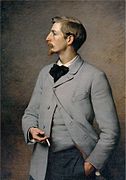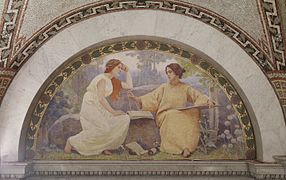Charles Sprague Pearce
Charles Sprague Pearce | |
|---|---|
 Pearce in his studio in Auvers-sur-Oise, c. 1895 | |
| Born | October 13, 1851 Boston, Massachusetts |
| Died | May 18, 1914 (aged 62) |
| Nationality | American |
| Education | Léon Bonnat in Paris |
| Known for | Painter, draughtsman, sculptor and print-maker |
| Movement | Orientalist |
| Awards | Chevalier of the French Legion of Honor: Order of Leopold, Belgium; Order of the Red Eagle, Prussia, and Order of the Dannebrog, Denmark. |
Charles Sprague Pearce (13 October 1851 – 18 May 1914) was an American artist.
Biography
[edit]
Pearce was born in Boston, Massachusetts. In 1873 he became a pupil of Léon Bonnat in Paris, and after 1885 he lived in Paris and at Auvers-sur-Oise. He painted Egyptian and Algerian scenes, French peasants, and portraits, and also decorative work, notably for the Thomas Jefferson Building at the Library of Congress at Washington. He received medals at the Paris Salon and elsewhere, and was made Chevalier of the French Legion of Honor, decorated with the Order of Leopold, Belgium, the Order of the Red Eagle, Prussia, and the Order of the Dannebrog, Denmark.[1][2][3]
Works
[edit]Among his best-known paintings are The Decapitation of St John the Baptist (1881); Prayer (1884), The Return of the Flock, and Meditation.[1] Pearce was also among those who knew and painted the Capri muse Rosina Ferrara.[citation needed]
Images
[edit]-
Paul Wayland Bartlett (1890)
-
Family (1896)
-
Labor (1896)
-
Recreation (1896)
-
Religion (1896)
-
Rest (1896)
-
Study (1896)
References
[edit]- ^ a b Chisholm 1911.
- ^ "Works by Charles Sprague Pearce at Sotheby's". Sothebys.com. Retrieved October 12, 2023.
- ^ "Charles Sprague Pearce (1851-1914)".
- This article incorporates text from a publication now in the public domain: Chisholm, Hugh, ed. (1911). "Pearce, Charles Sprague". Encyclopædia Britannica. Vol. 21 (11th ed.). Cambridge University Press. p. 24.
- 1851 births
- 1914 deaths
- 19th-century American painters
- 19th-century American male artists
- 20th-century American painters
- American muralists
- American male painters
- Painters from Boston
- American Orientalist painters
- Knights of the Legion of Honour
- Order of the Dannebrog
- 20th-century American male artists
- American painter, 19th-century birth stubs







